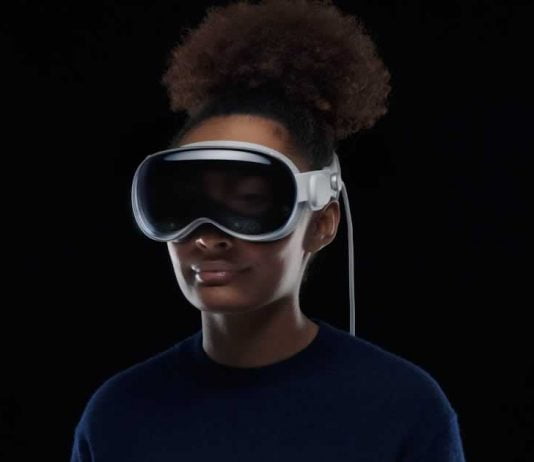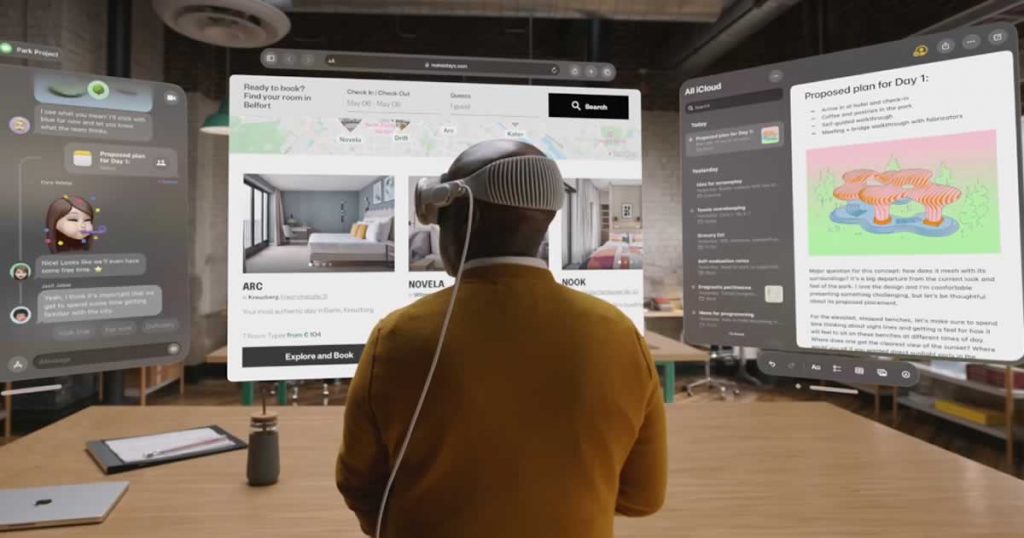After years of speculation and anticipation, Apple finally unveiled its long-rumoured and highly anticipated AR headset at the Worldwide Developers Conference (WWDC) 2023. Named “Vision Pro,” this cutting-edge device marks a significant leap forward in spatial computing and augmented reality (AR) technology.
One of the standout features of the Vision Pro is its sleek design, resembling ski goggles. The device sports a curved display made from integrally moulded glass, seamlessly integrated with an aluminium frame. The headband comes in various sizes and features cushioning, breathability, and elasticity for maximum comfort. Furthermore, the headband is simply detachable and replaceable, allowing users to customize the fit and design to their liking.
The Vision Pro, powered by the newly created “visionOS,” lets users create a personalized workspace by showing numerous windows and applications in their physical surroundings. This unique spatial experience makes it a powerful tool for professionals across industries.
Unlike other AR headsets, the Vision Pro does not have a separate controller. Instead, it introduces an innovative input operation system that can be controlled by the user’s eyes, hands, and voice. Users can navigate apps using their gaze, tap to select items, scroll by moving their wrist, and input text using voice commands. Additionally, the Vision Pro supports peripherals like the Magic Keyboard and Magic Trackpad, enabling users to work seamlessly, similar to a Mac computer.
Underpinning the Vision Pro’s capabilities is the powerful M2 processor, the same chip found in Apple’s MacBook lineup. This standalone headset doesn’t require a connection to a Mac or other devices to operate, offering greater flexibility and freedom to users. However, this impressive performance comes at the cost of battery life, with Apple stating that the headset lasts for only two hours. To address this, the Vision Pro includes a battery pack that needs to be connected to the headset via a cable, similar to Magic Leap’s AR headset.
The centrepiece of the Vision Pro is its display, featuring two newly developed micro-OLEDs. With a wide colour gamut, HDR support, and 23 million pixels — more than a 4K display — the display delivers exceptional visual quality. Apple has also collaborated with German optics manufacturer Zeiss to incorporate an optical insert, enhancing display performance and tracking accuracy. While specific details about the field of view (FOV) and other display specifications are yet to be revealed, the overall visual experience promises to be immersive and captivating.
To process inputs from the 12 cameras, 5 sensors, and 6 microphones embedded in the Vision Pro, Apple has introduced a new chip called the R1. This chip enables lightning-fast image streaming to the display, happening within 12 milliseconds — eight times faster than the blink of an eye. The result is a seamless experience where the content appears instantly in front of the user, enhancing immersion and interaction.
Apple has also integrated a unique feature called “EysSight” to facilitate communication while wearing the headset. This system places a display on the front of the device, projecting images around the wearer’s eyes to inform others engaged in face-to-face conversations. This function resembles an evolved version of an eye mask, with eyes drawn on it, ensuring a more natural and engaging social experience.
Furthermore, the Vision Pro can effortlessly switch between AR and VR functions, providing users with the flexibility to explore both modes of reality. By turning a dial similar to the crown on the Apple Watch, users can seamlessly transition between AR and VR experiences, offering a versatile and intuitive user interface.
In terms of security, the Vision Pro introduces a new biometric authentication system called Optic ID. This system analyzes the user’s iris under various LED lights and compares it with encrypted data stored in the device’s Secure Enclave. This mechanism ensures instant unlocking of the Vision Pro while preserving user privacy and security.
The Vision Pro is slated to be available in early 2024, initially in the United States, with a global rollout planned for the second half of the year. Priced at $3,499, it positions itself as a premium device targeting professionals seeking cutting-edge AR capabilities. With its revolutionary features, sleek design, and Apple’s commitment to pushing technological boundaries, the Vision Pro is poised to significantly impact the AR/VR market and pave the way for a new era of spatial computing.

